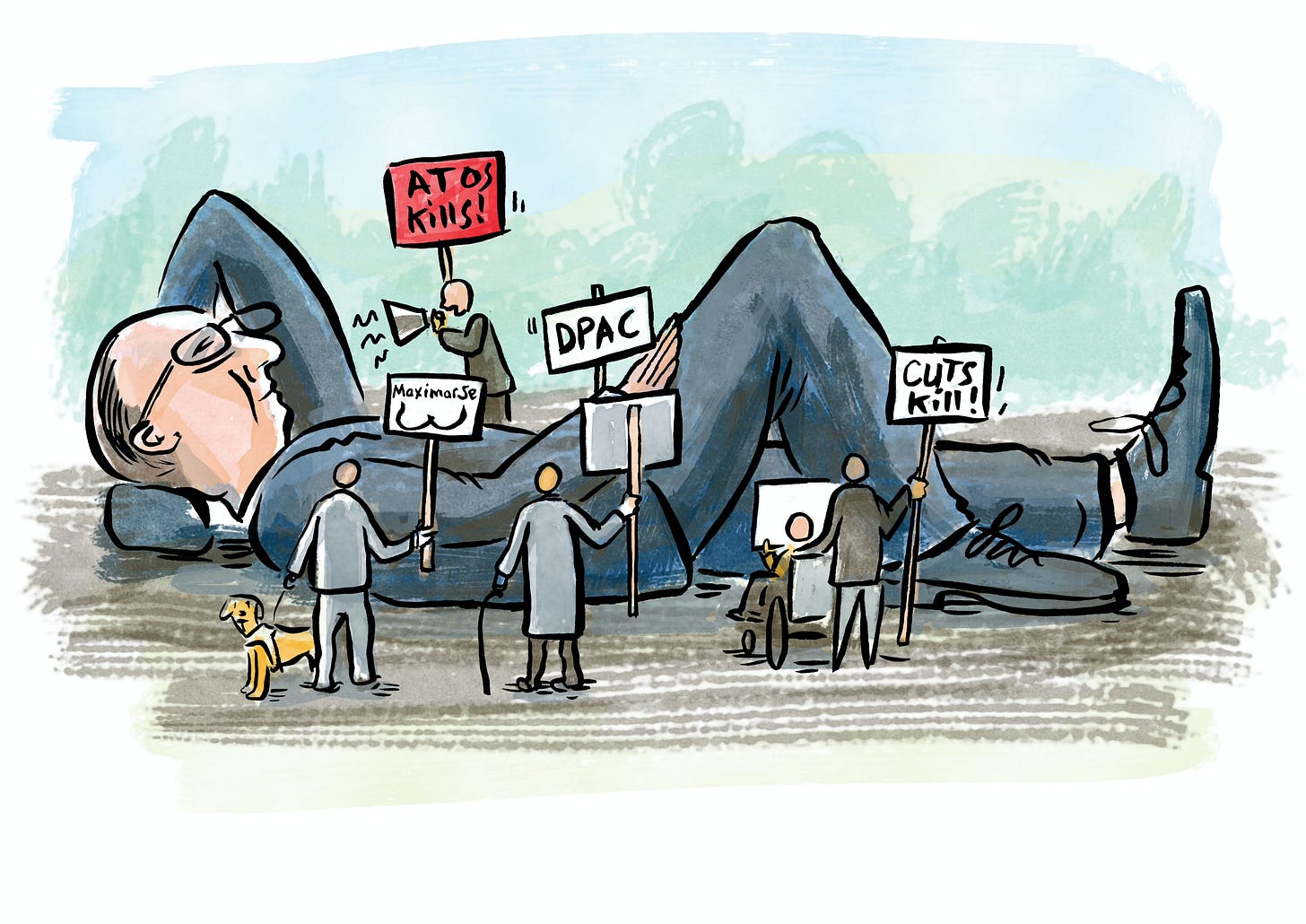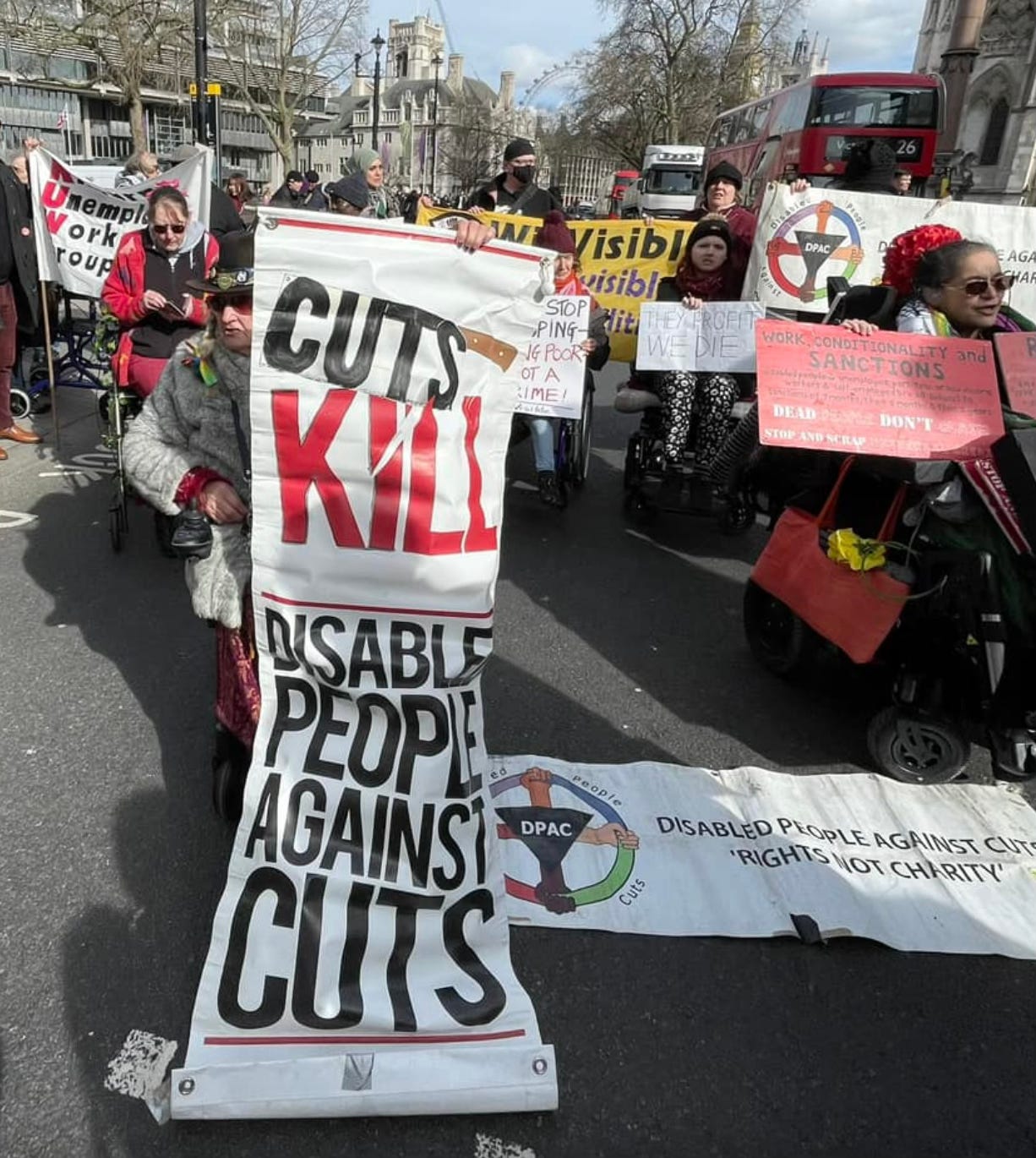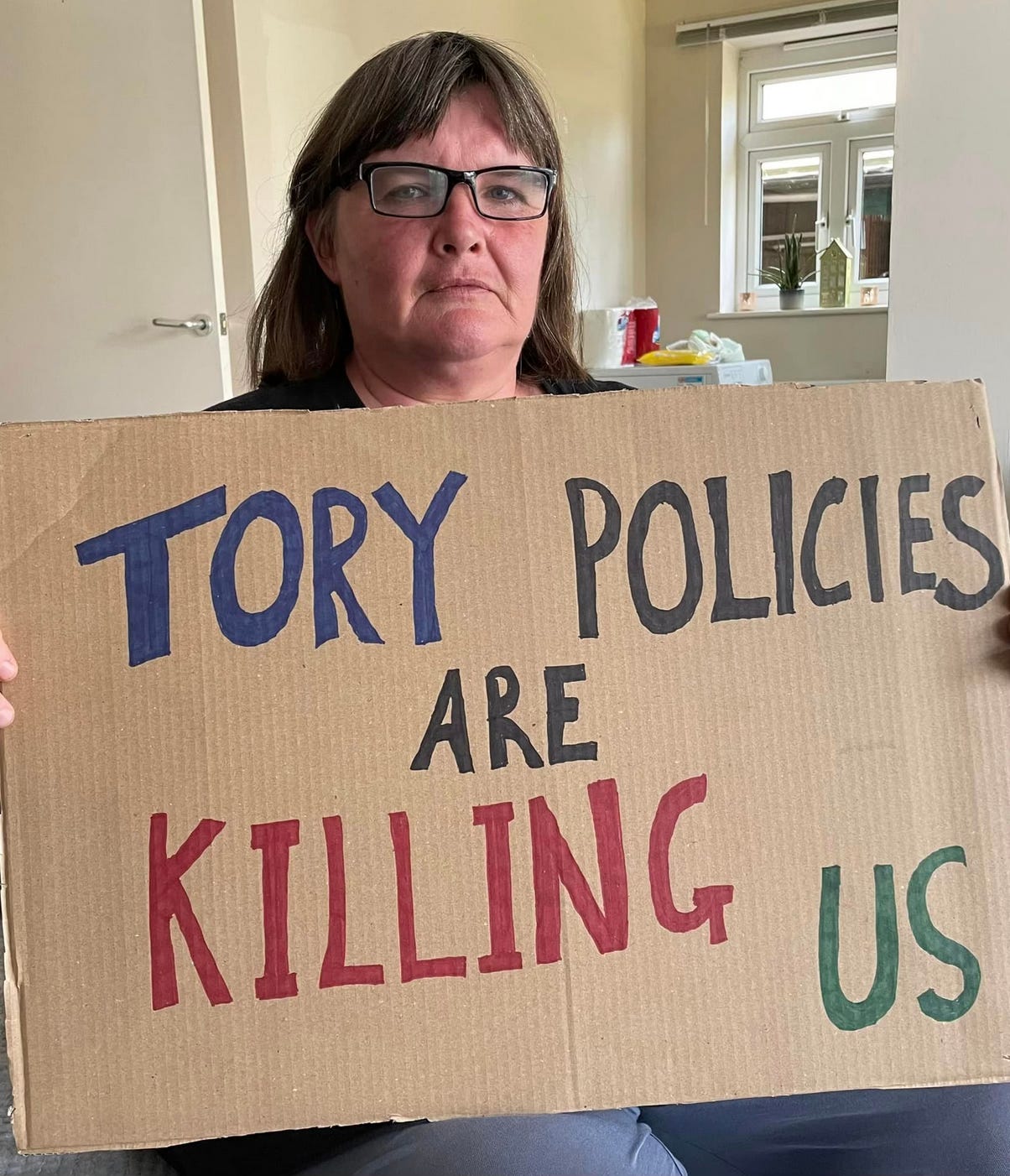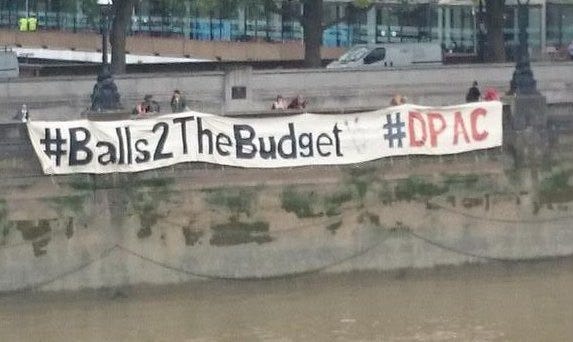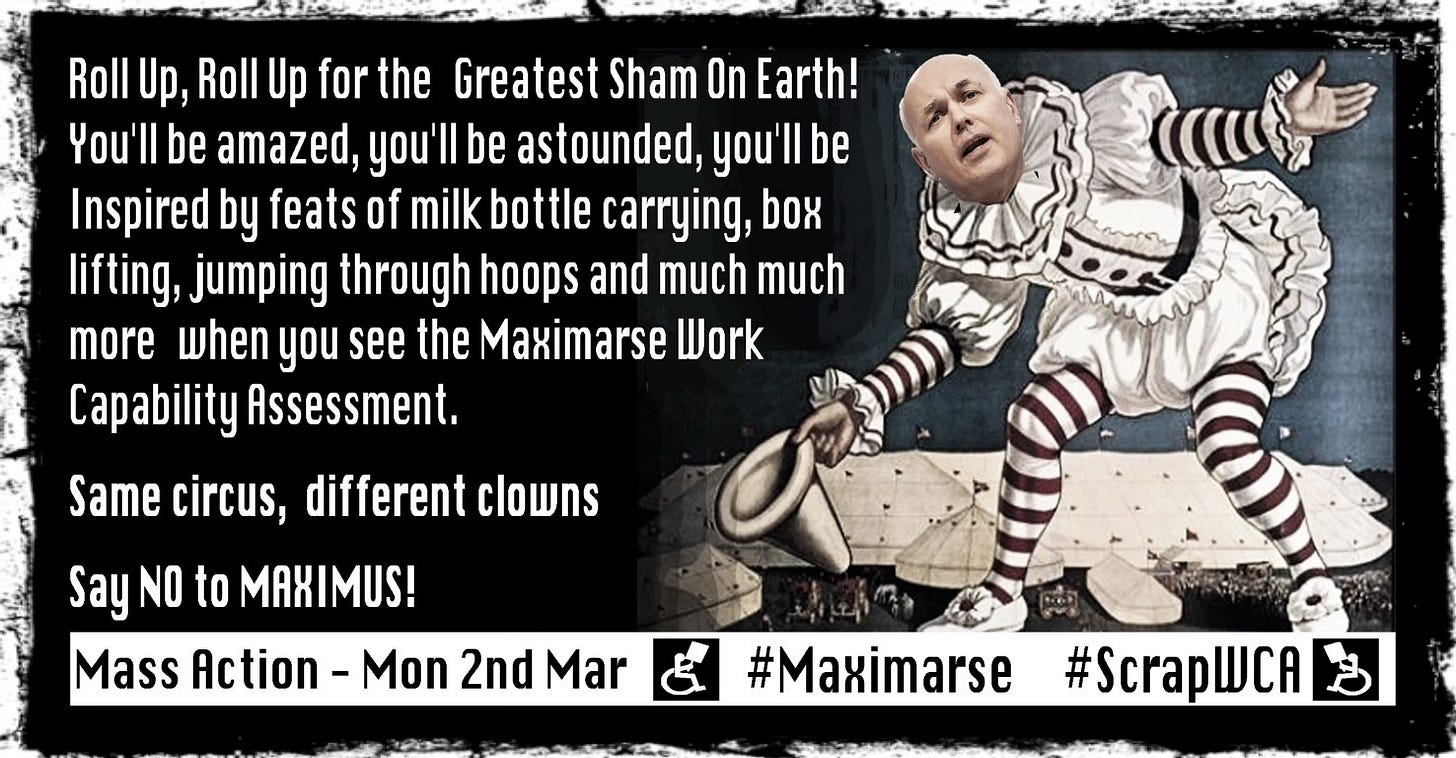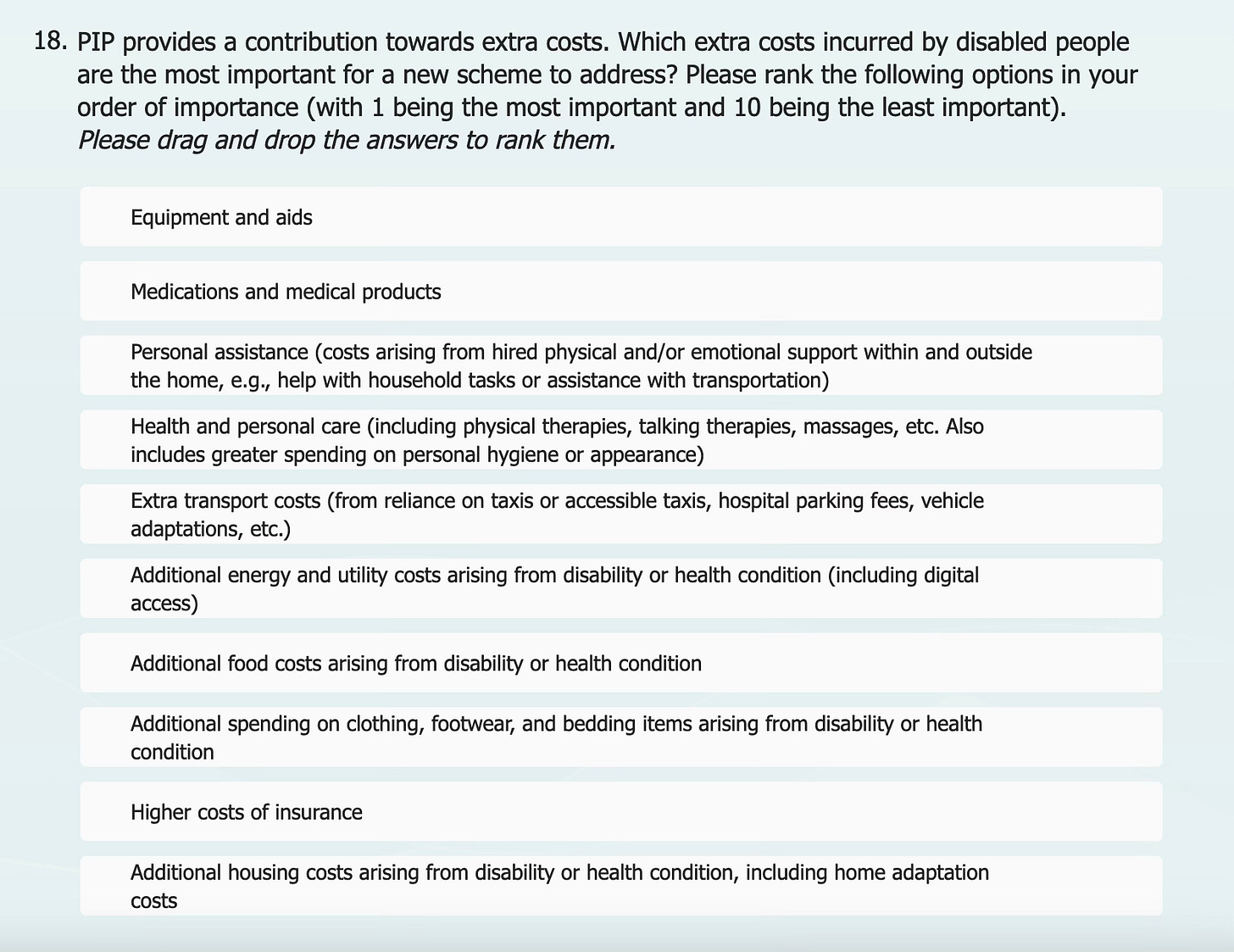"DPAC is all about hope"
Disabled People Against Cuts is gearing up to take on the government… AGAIN
Note to those reading via email: This article may exceed the length that can be sent by Substack. In which case, please click on the headline and it will take you directly to the Substack article.
By Holly Donovan
With his latest strike in the war on disabled people, Prime Minister Rishi Sunak has announced even more dangerous “reforms” to Work Capability Assessments (WCA) and Personal Independence Payments (PIP) which are so important to the financial—and hence emotional—wellbeing of many in our community.
Media reports this week suggest that “nearly half a million people who claim PIP could face having the amount they receive every week cut”.
One no-holds-barred commentary by an experienced group named “Benefits and Work” calls the government proposals “a ragbag of random, cruel and foolish ideas thrown together by the Department of Work and Pensions (DWP) to serve the political needs of the Conservative Party, without any likelihood of any of them being acted upon.”
But to multimillionaire Sunak, this crusade aims to take on the UK’s purported “sick note culture”. And while these planned huge cutbacks are but “the latest strike”, disabled people feel as if they have always been at war with this government.
The Left Lane spoke to Paula Peters, a disabled activist, about the war on disabled people, how Disabled People Against Cuts (DPAC) has responded in the past, and, more importantly, how they plan to fight back in coming weeks.
Paula is a member of DPAC’s national steering group which is a grassroots organisation run by disabled people and for disabled people. DPAC was founded in 2010 in the wake of the first wave of cuts due to austerity and, as Paula explained in a Zoom interview with us this week, DPAC “welcomes all who refuse to be silent against the injustices suffered by disabled people.
“Hope That We Can Resist, Organise and Mobilise”
“DPAC is about hope” said Paula. “It’s about direct action (peaceful, non-violent direct action). Giving disabled people hope that we can resist, organise and mobilise to fight back.” In other words, “being in the public eye on the streets and online.”
When the Tory government’s Welfare Reform Act of 2012 came into effect, DPAC was on the front lines campaigning against the murderous effect this would have on disabled people.
Chaining wheelchairs together, DPAC activists blocked the roads in Parliament Square in protest. At this time, many disabled people noticed a shift in governmental rhetoric and in the mainstream media.
Benefit claimants were being demonised and becoming a handy scapegoat. It was a cynical Tory strategy to perpetuate the myth that the money of hard working people was being siphoned off by lazy, undeserving, fake-disabled people.
Stories of the appalling Work Capability Assessments (WCA) undertaken by a huge multinational third-party company called ATOS spread like wildfire through the disabled community.
Here Is How the WCA Scheme Operates
The WCA test is used to decide whether claimants of ESA or Universal Credit are fit for work. The test is to show how a claimant’s illness or disability affects their ability to work via forms and a face-to-face assessment.
An assessor will follow a computer programme (created by ATOS) called LiMA to decide if a claimant can reliably, repeatedly, in a timely manner, safely and without significant pain perform work related activities such as type on a keyboard, move around, sit for a period of time and communicate clearly with others.
The result places a claimant in one of three groups:
Fit for work
Unfit for work but for ‘work related activity’ (Work-related activity group)
Fit for neither work nor ‘work related activity’ (the Support group). More here.
A 2015 academic study concluded that “the programme of reassessing people on disability benefits using the Work Capability Assessment was independently associated with an increase in suicides, self-reported mental health problems and antidepressant prescribing. This policy may have had serious adverse consequences for mental health in England, which could outweigh any benefits that arise from moving people off disability benefits.”
A newspaper article in the same year gave a personal story of how this “broken and unsafe” assessment system had caused the death of Michael O’Sullivan, a 60-year-old builder and father from Highgate in north London.
Official government statistics released by the DWP from August 2015 showed that 90 people a month died after being declared fit for work. That meant a total of 2,380 people died between December 2011 and February 2014. No wonder DPAC asserted that Atos kills.
Traumatic and insulting assessments were commonplace, but most terrifyingly, people who were long term sick and terminal cancer sufferers were being found fit for work. DPAC brought this into the public eye via its ‘ATOS Kills’ campaign.
Paula Peters of DPAC
Loss of Friend Had ‘Profound Effect’ on Paula
Paula Peters joined DPAC in 2012 after a close friend took their life due to being found to be fit for work after a WCA test. This loss had a profound effect of Paula, with the stress and all-consuming fear of the WCA causing her to be hospitalised for three months in a mental health unit afterwards.
Whilst in a psychiatric unit Paula witnessed other patients being sent Employment and Support (ESA) forms to complete. “Being unwell and in hospital but having to fill out ESA questionnaires or they (the DWP) will stop your benefits. It’s disgusting and it still happens today (in 2024). People are hounded by the DWP when they are at their most vulnerable,” Paula explained to The Left Lane.
This experience gave Paula the incentive to learn as much as possible about ESA and the WCA. Finding DPAC on Facebook and learning of the ‘ATOS Kills’ campaigns, Paula thought: “I want in. I wanted justice for my friend, I wanted justice for those patients in hospital, and I wanted justice for all those people who will be hurt by ATOS”.
It was far from easy sailing. Sometimes there were physical confrontations and scuffles between DPAC activists and the police. Here, for example, you can see some BBC News footage of an August 2012 protest outside the Westminster headquarters of ATOS.
Hearing that Atos were to sponsor the Paralympic games in London 2012 DPAC kicked their ‘ATOS Kills’ campaign into top gear by holding a week of action.
They picketed the ATOS headquarters in London and ATOS offices in Cardiff, Glasgow and Belfast while also occupying the DWP lobby in Whitehall. Scores of people using wheelchairs chained themselves together inside the DWP lobby whilst a huge protest was held outside.
During the week of the Paralympic games in 2012, DPAC held the ‘ATOS games’. They created an ‘ATOS miracles’ tent where “claimants” went into the tent disabled and came out miraculously healed. This humour in the face of oblivion has been a key part of DPAC campaigning.
Campaigners Tipped out of Wheelchairs by Kettling
It was during these direct actions that Paula experienced being kettled for the first time. “It was awful, my friend had their shoulder broken, there were people being tipped out of wheelchairs, but it finally brought the public eye onto what we were doing and why”.
They focussed on forcefully challenging the reputation of ATOS by outing the stories of disabled people, by publicising the experience of an Atos whistle-blower—seen here in a BBC interview —and by direct action.
DPAC kept the heat on Atos and the DWP for a long time. They exposed how ATOS was a huge conglomerate that owned shares in many businesses such as Siemens IT and Google Cloud and how ATOS held the desktop GP contract for the NHS and the UK passport control contracts. ATOS won contracts for more than £400 million in 2012 from the government for its DWP contracts alone.
The unrelenting DPAC campaign finally paid off. Their actions were, in large measure, responsible for a drop in the value of ATOS shares. In 2014, before the WCA contract was due to end, ATOS pulled out of the DWP.
This was a huge victory for DPAC.
Iain Duncan Smith, then DWP Minister
But this victory was short lived though, because in 2015 another company called Maximus then took over those same contracts. (The corporate slogan of Maximus is “experts in helping people in challenging times.”)
The “Same Circus, Different Clowns” Campaign
DPAC then began to target Maximus (to which it gave the moniker of MaximARSE) as part of its ‘Same circus, different clowns’ campaign. Again, they tried to do their utmost to trash the reputation of Maximus, with bare bums showing on all their campaigning materials.
With local groups set up, DPAC next took the fight was to local councils. DPAC fought against cuts to social care, cuts to personal budgets, and cuts to accessible transport. If it affected the lives of disabled people, DPAC were there to campaign about it.
On the world stage DPAC participated in the challenge of the UK government under the UN Conventions of the rights of disabled people. This challenge has been ongoing since 2016. In 2024, a UN committee concluded: “The UK government has made no significant progress in addressing the grave and systematic violations of Deaf and Disabled people’s rights… the report notes areas of further regression and numerous issues of deep concern.”
“Three Rows of Police Kettled Us”
Back in 2014 and hoping to pit church against state on these matters, DPAC members, including Paula, chained themselves to the railings of Westminster Abbey and occupied the grounds. “While chained to the railings the police were coming at us, some were armed. Three rows of police kettled us, blocking us from sight. I suddenly felt a hand on my shoulder and feared the worst, but it was Labour MP John McDonnell.”
“He had tears in his eyes seeing the appalling treatment the DPAC activists were enduring. He contacted the police and demanded to speak to the Dean of Westminster. For the entire six hours that we were kettled, John did not leave our side. He came to me and promised that he would raise this on the floor of the house (of parliament) and he did,” Paula said in the interview.
The fact is, however, that Labour’s only response to Sunak’s latest crusade of 2024 against disabled people has been to say “big changes” are needed in the welfare system, but has not specified what those changes should be. The response “Vote Labour” and you will find out may convince some, but others will be sceptical. Today, McDonnell is just another backbench Labour MP and Keir Starmer seldom listens to him.
As for DPAC, all radical tactics are on the table, whether it is challenging the reputations of companies or MPs, mobilising to kick MPs out of their seats such as the ‘Get rid of Ester McVey campaign’ (the then Parliamentary Under-Secretary for Work and Pensions), storming parliament during PMQ’s or occupying space and chaining wheelchairs together in direct action.
“Being Clever and Innovative”
“It’s all about being clever and innovative, grabbing public attention”, Paula told me.
In another campaign victory, DPAC proudly forced a government U-turn when the Conservative Government launched a public consultation on how aids and adaptations were to be accounted for during PIP assessments.
“Lobbying works, we can force U-turns” Paula grinned.
DPAC has a history of encouraging disabled people to register to vote. “With the upcoming election it’s so important that everyone is registered to vote. Attend hustings, ask the difficult questions. Get your voice heard.”
With the current attacks and yet more Tory scapegoating of disabled people, Paula reminds us that “DPAC gives disabled people hope. If we mobilise and organise, we can push the government back. Change won’t happen immediately, but we can make it happen. Know your rights, learn what you can. By supporting each other we can get through this. Together.”
“Being part of DPAC has saved my life” Paula told me. The sense of community, understanding and the anger is a fuel that drives DPAC activists forward. “Yes. I’m an activist but that doesn’t mean that I’m not scared, as I am. I’m scared, I’m angry, I’m vulnerable. That won’t stop me though, it won’t stop us.”
PIP Is Current Focus of Government Attack
Announced in mid-April, the latest government target is Personal Independent Payment or PIP as it is often called.
PIP is a non-means tested benefit that helps a disabled person meet some of the extra cost of living, as to be disabled means you incur extra costs in comparison to a non-disabled person.
The benefit comes in two parts, a daily living part and a mobility part. Not every disabled person will be awarded both parts. Claimants will be assessed as either not needing support at all, needing standard support or enhanced support, for each of the parts. A government website gives more of the basics.
The Tory government wants to reduce the amounts paid both to the individuals and the cost of the entire PIP programme. The government makes it case in a Green Paper published on 29 April.
“I am determined to find ways of making the system work better for those with the most severe disabilities and health conditions, including through improved models of assessment, treatment and support as this consultation sets out,” says DWP minister Mel Stride in the foreword.
DPAC held an emergency national meeting after Rishi Sunak’s latest barrage across the bow of PIP claimants. Targeting those with mental health issues for the latest rounds of cuts will no doubt cause more deaths due to the trauma, stress and all-consuming fear that come with PIP assessments.
What’s More Important? Medication or Food?
Here is an example of the type of question which the DWP is proposing that disabled people should be asked as part of the so-called PIP “reforms.”
In its 30 April response to Question 18 (above), the ‘Benefits and Work’ group decodes the meaning of this question on the form.
This DWP Green Paper asks “… people which are the most important needs that should be addressed—suggesting that not all of them can be. Respondents are asked to rank in importance from 1 to 10, such items as medications and medical products, additional food costs, additional energy and utility costs (and) additional housing costs. So, people really are being asked to decide if it is more important that disabled people get their medication, eat properly or heat their homes.”
This hits the nail on its head. As a disabled person myself, I would hope even those of our readers who are not disabled can appreciate how awful this is. I personally need both food and medication to survive, who would have thought it?
For now DPAC are considering their next steps in fighting this latest battle. One thing is for sure, they will not be silent in the face of destruction.
Even before the recent cuts were announced, Disability News Service reported on 22 February that DPAC was readying for action.
Today (16 May) in London the group Inclusion London is holding a meeting of various deaf and disabled groups to discuss how to respond to this Green Paper and to plan a fight back campaign.
The Left Lane says “Solidarity.”
Want to know more about DPAC? Want to join in the upcoming campaign?
Check This Out
The latest on the Israeli genocide in Gaza:
While Starmer and Sunak keep trading “gotcha” jibes as the general election gets ever nearer and while they both keep putting Israel’s genocidal war on the” ignore it” pile, the news from Gaza and the global support movement was almost universally bad this week.
A photo feature (dated 14 May) from Al Jazeera: “Palestinians mark 76 years of Nakba as new tragedy unfolds in Gaza.”
A wide range of media sources has reported that the US plans to send another US$ 1 billion in weaponry to Israel. This follows an 11 May Associated Press story that “the Biden administration said Friday that Israel’s use of U.S.-provided weapons in Gaza likely violated international humanitarian law…”
The Met Police continue to harass pro-Palestine demonstrators in London. Marieha Hussein tells her story in this brief Instagram clip.
How low can you go? Gangs of roving Israeli settlers are attacking convoys of trucks carrying aid to starving Palestinians and destroying the contents.
Informed commentators are connecting the dots. They suggest Benjamin Netanyahu has come to the conclusion that he will be able to remain as Israel’s Prime Minister as long as this war continues. Once it is over, he will be toast. Reason # 47 for a permanent end to this monstrous war.
Labour’s shadow foreign secretary David Lammy has made one of the most asinine comments of this war, a war marked by fatuous and hateful views. Lammy recently told US Republicans that Nelson Mandela would have opposed the US student protests in support of the Palestinians. To propagate such nonsense is Reason #48 why more and more people consider that a widely-predicted Labour government will be nothing to warm our hearts.
Meanwhile there was some good news:
Last week “the United Nations General Assembly (UNGA) overwhelming voted to support a Palestinian bid to become a full UN member by recognising it as qualified to join and recommending the UN Security Council “reconsider the matter favourably”. A total of 143 countries voted in favour. The UK abstained. David Lammy and Labour were, of course, silent.
Here is the link to a brief Instagram video with some good news from the United States: more and more young people are fed up with being lied to about the role of their country in the world
… And
If you are able, try to attend Saturday’s pro-Palestine march and rally in London.
Many thanks to Glyn Goodwin for the terrific illustration he prepared for the cover of this week’s issue.
Edited by Alan Story, The Left Lane is a reader-supported publication. To receive new posts and support our work, consider becoming a free or paid subscriber.
You can reach us at: theleftlanepolitics@gmail.com




